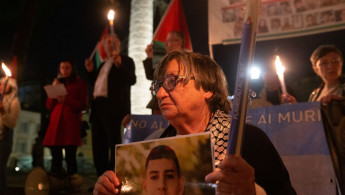Palestinian child prisoner Shadi Khoury is out of prison, but now under house arrest
An Israeli Court agreed to release Shadi Khoury after six weeks of confinement in the Damon prison, south of Haifa. The 16-year-old is now under house arrest pending trial. On Sunday, the Court ordered the conditional release of two more minors but kept three in detention.
Last month the Israeli police raided the homes of Shadi, and several boys, ages 14-16, on suspicion of causing disturbances and attempting to harm Israelis in Beit Hanina in occupied East Jerusalem. They will now face charges under a 'terror clause', which could carry harsh sentences.
The boys were questioned by the police in the absence of their parents or lawyer, contrary to the rules. According to counsellors working the cases, they even obtained confessions from some minors.
Shadi is now facing charges for causing disturbances and bashing a vehicle of an Israeli. He has denied the accusations.
"Shadi did not confess to anything," Rania Elias, Shadi's mother, told The New Arab. "The prosecution insisted against sending the children to house arrest."
The trial will begin on December 12, 2022.
Interrogation officers often sidestep rules designed to protect minors by notifying the judge that the presence of a third party, like a parent or a lawyer, may impede the course of questioning. Counsellors told TNA that the Israeli police battered the children involved in this case during the arrest stage and inside the police stations.
Recently, a Court in Be'er Shiva (Be'ir al-Sabae) extended the solitary confinement of 20-year-old Palestinian prisoner Ahmed Manasra by an additional four months based on secret evidence, the legal centre for Arab minority rights in Israel, Adalah, said in a statement.
Manasra has a mental disorder. Doctors warned that keeping a person with a mental health condition in solitary confinement may exacerbate his situation.
Ahmed is serving a nine-and-a-half-year prison sentence after being convicted of attempted murder in 2014 at the age of 13. The Israeli state attorney's office contended that "isolation is necessary" to ensure the safety of Manasra and other prisoners and to "maintain order and discipline in prison."
Adalah argued that keeping Manasra in solitary confinement amounts to "torture."





 Follow the Middle East's top stories in English at The New Arab on Google News
Follow the Middle East's top stories in English at The New Arab on Google News
![Netanyahu furiously denounced the ICC [Getty]](/sites/default/files/styles/image_330x185/public/2024-11/GettyImages-2169352575.jpg?h=199d8c1f&itok=-vRiruf5)
![Both Hamas and the Palestinian Authority welcomed the ICC arrest warrants [Getty]](/sites/default/files/styles/image_330x185/public/2024-11/GettyImages-2178351173.jpg?h=199d8c1f&itok=TV858iVg)
